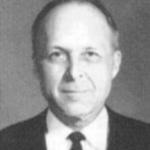Interviewer: Jennifer Lee
Interview Date: March 17, 1983
Location: Corvallis, Oregon
Duration: 2:32:14
This interview begins with Cornell recalling his experiences working with Fred Merryfield. Cornell notes that Merryfield was an exceptional engineer but was not the best partner when it came to working with clients, as he could dominate conversations and come across as abrasive. Despite this, Merryfield did not dominate business discussions, and was often quiet during the recurring partner meetings they held. Cornell notes that Merryfield’s primary goal was to do high quality, interesting engineering work, and that money was not one of his concerns. Cornell also notes that Burke Hayes worked with Merryfield the best, and was less domineering than Merryfield was.
The conversation then turns to Cornell’s opinions about which partners worked best with which audiences. Cornell explains that Archie Rice worked best with practical clients, Jim Howland could inspire a crowd, and Hayes could present to anyone as long as he was adequately prepared. When reflecting on his own strengths, Cornell notes that he does best with businessmen and politicians. Cornell also elaborates on Haye’s contributions to the firm, explaining his technological developments, business acumen, social relationships, and ability to see beyond the firm’s present circumstances at any given time. Cornell also discusses Ralph Rodrick and his major contributions to the firm before.
While discussing Rodrick, Hayes, and Howland, the topic of politics and religion comes up. Cornell notes that they are all varying degrees of conservative, and explains that he himself is not religious. Cornell and the interviewer briefly discuss their views on religion. Cornell is not religious. He explains that Jim Howland is and has a strong sense of personal morality that guided his actions when he was president. While Cornell says he respects Howland’s personal morality, he took issue with Howland expecting CH2M employees to adhere to that same code.
The interview concludes with a brief explanation and conversation about the economic structure of CH2M. Cornell notes that he and the other partners all agreed that employees should own a stake in the company and its success. Because of this, CH2M employees receive stock in the company, and are able to grow their stock portfolio throughout their careers. In reflecting on this system, Cornell notes that he believes it motivates the employees and gives them a personal investment in the company’s success.
Dublin Core
Title
Description
The conversation then turns to Cornell’s opinions about which partners worked best with which audiences. Cornell explains that Archie Rice worked best with practical clients, Jim Howland could inspire a crowd, and Hayes could present to anyone as long as he was adequately prepared. When reflecting on his own strengths, Cornell notes that he does best with businessmen and politicians. Cornell also elaborates on Haye’s contributions to the firm, explaining his technological developments, business acumen, social relationships, and ability to see beyond the firm’s present circumstances at any given time. Cornell also discusses Ralph Rodrick and his major contributions to the firm before.
While discussing Rodrick, Hayes, and Howland, the topic of politics and religion comes up. Cornell notes that they are all varying degrees of conservative, and explains that he himself is not religious. Cornell and the interviewer briefly discuss their views on religion. Cornell is not religious. He explains that Jim Howland is and has a strong sense of personal morality that guided his actions when he was president. While Cornell says he respects Howland’s personal morality, he took issue with Howland expecting CH2M employees to adhere to that same code.
The interview concludes with a brief explanation and conversation about the economic structure of CH2M. Cornell notes that he and the other partners all agreed that employees should own a stake in the company and its success. Because of this, CH2M employees receive stock in the company, and are able to grow their stock portfolio throughout their careers. In reflecting on this system, Cornell notes that he believes it motivates the employees and gives them a personal investment in the company’s success.

